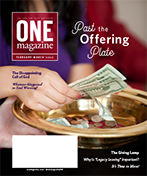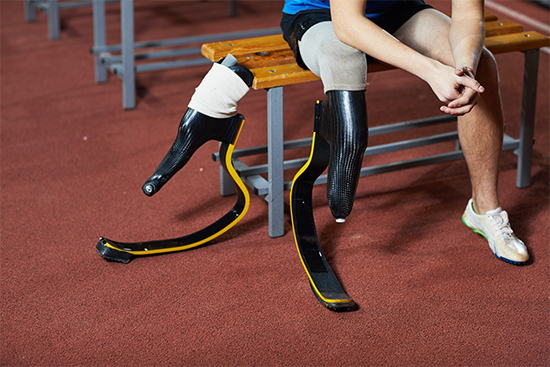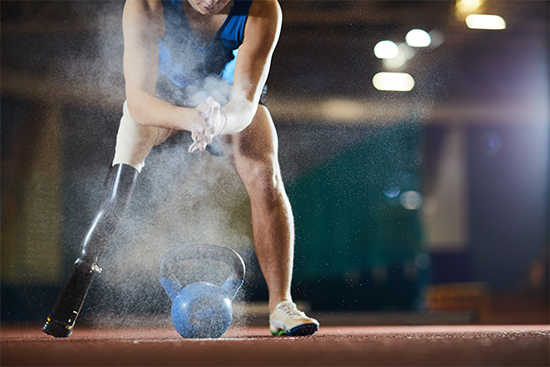
February -
March 2022
Stewardship: Past the Offering Plate
------------------
|





Things That Went Right
By Bill and Brenda Evans
Tokyo prepared 43 venues for the 2020 Olympic and Paralympic Games.
But August 24, 2021, the Paralympics opened in the same, almost empty
68,000-seat National Stadium as the Olympics had a few weeks earlier. Yet, a few Americans did attend. Team USA had 239 Paralympic athletes who, over the next 12 days, competed for and won 104 medals—37 gold.
Dr. Bill Nichols, a sports medicine chiropractor from Ashland, Kentucky, was there with a will to do good and a heart for sports medicine. Bill was part of a 16-member staff of USA physicians, physical therapists, athletics trainers, and mental health therapists committed to keeping Team USA’s Paralympians healthy, happy, and competing.
Altogether, 4,403 athletes from 163 nations and their support staffs came to Toyko, poised and eager to compete in 22 sports and 539 events. Paralympic athletes are classified according to functional impairments or disabilities, a cornerstone of the Paralympic movement. To qualify, athletes are first evaluated on Eligible Impairment Types, and if deemed eligible, further designated by Sports Class Groupings.
Eligible Impairment assessment is based on an athlete’s muscle power, range of motion, limb deficiency, leg length, height, vision impairment, intellectual impairment, and various other disadvantages related to conditions such as cerebral palsy, traumatic brain injury, and stroke. If eligibility is granted, athletes are then grouped by one of 50 Sports Classes. The goal of these complex eligibility and classification processes is to assure athletes compete equitably.

Nick Mayhugh, a gold medal 100-meter sprinter with a T37 classification, commented on his classification. “It’s okay to not be okay. I used to be embarrassed, and I shouldn’t have been because look where I am now.” Mayhugh, with a form of cerebral palsy that impairs motor skills on his left side, set a Paralympic 100-meter world record of 10.95 seconds.
Bill’s first duty in Toyko was to dive into team health records to assess and “red flag” athletes with cardiac or mental health histories—issues most likely to hinder their competition early on. As competition began, Bill treated Team USA athletes and attended USA events as the on-site physician. He was often ring-side for Tae Kwon Do, for example. As a Black Belt himself (certified by Chuck Norris, no less) Bill was especially interested in the sport. And there were other events such as Goalball for the blind, Women’s Sitting Volleyball, Men and Women’s Wheelchair Tennis, and others.
“Paralympians are driven,” Bill said, as he described an “amazing” blind male sprinter. “To them, they are less handicapped than inconvenienced.” For example, a male Wheelchair Tennis player in his mid-40s went up against much younger opponents. One Table Tennis athlete with no arms competed holding his racket (paddle) in his mouth. Women’s Sitting Volleyball was played that way—sitting—and Team USA women beat China for gold.
Bill was regularly courtside for Team USA’s Dana Mathewson, a Women’s Wheelchair Tennis athlete. As a child, Dana contracted Transverse Myelitis, a rare neurological disease that attacks the spinal cord, leaving her partially paraplegic. The onset was sudden at age ten. Within 30 minutes, she went from running sprints at soccer practice to lying on the floor unable to move her legs. By 13, Dana was going to adaptive sports camps, dragged at first by her mother, “screaming all the way,” she confesses. Yet within two hours of her first camp, Dana had a “huge smile.” She tried wheelchair basketball and wheelchair rugby, but wheelchair tennis snagged her for good.
After high school, the University of Arizona offered her a scholarship in adaptive sports to play Wheelchair Tennis. There she earned undergraduate and graduate degrees, and later her doctorate in audiology at University
College London.
Dana is now 30, a professional female Wheelchair Tennis athlete, and currently ranked first in the world. She has competed at the World Cup, French Open, American Games, British Open, along with many others.
“Dana is just a normal person,” Bill says. “In our society we have this thing about being ‘different.’ Dana’s not ‘different.’ After Tokyo she headed to Sardinia, Italy, for competition. These athletes get focused, find something they like and want to do, and they do it.” Like three-time Paralympian Chuck Aoki who first knew Wheelchair Rugby as Murderball. At 30, he carried the U.S. flag into National Stadium for opening ceremonies and led his team to a silver medal.
Bill understands that urge to focus on a thing you want to do and do it no matter what. He was saved and baptized at eight, and by high school determined to pursue a career in medicine. His grades were above average but not stellar. When he mentioned becoming a doctor, one of his Rock Hill (Ohio) beloved teachers said, “No, way!” half teasing him. But Bill was not deterred. He headed to Kent State for pre-med and English. After a year, he returned home and enrolled in Ohio University and then Marshall University, still thinking about medicine.
In 1991, Bill’s mother died in an automobile accident, hit by a drunk driver. Her death triggered a renewed focus in Bill. “If I’m ever going to do something, I need to do it now,” he said. In 1992, at age 24, he was in Davenport, Iowa, getting ready to enroll at Palmer College of Chiropractics. By 1998, Bill was back in Kentucky with his chiopractic degree, soon married to Missy—a nurse—and later father of two: Caden and Jenna.
In 2008, Bill pursued yet another dream: Sports Medicine Certification. He jumped into the year-long sports medicine course, passed the national board exam, and is currently team physician for Marshall University and Boyd County High School sports teams. Next, he applied for and was accepted to the Team USA Olympic medical staff, with training in Colorado Springs. In addition to Tokyo, he has served on Olympic medical teams in Bulgaria for boxing qualifications and at Lake Placid,
New York, for winter sports.
Bill doesn’t mince words about Paralympians: they are normal, amazing, driven, and special—all at once. Haven Shepherd was born in Vietnam to parents whose circumstances were so dire, they pledged themselves to a family suicide and strapped bombs to themselves while holding baby Haven. Her parents died, and Haven was blown 40 feet, experiencing severe damage to her legs. At 20 months, Haven was adopted by a Missouri family, learned to swim in their backyard pool, and at age 18 traveled to Tokyo, where she placed fifth in the Para-swimming 220-meter individual medley. Haven calls herself a miracle and being an amputee a gift.
Twenty-one military veterans competed at Tokyo. Swimmer Elizabeth Marks, a combat medic in Iraq, lost her left leg. Blinded in Afghanistan, Brad Snyder won gold in Triathlon. Swimmer Jessica Long, a double amputee and bronze medalist, is still active in the U. S. Army. Triathlete Melissa Stockwell lost a leg to an IED in Baghdad. In recovery at Walter Reed, she felt gratitude: “I lost one leg. Some here have lost both legs, their arms, and are blind….Instead of finding things that went wrong, I look at things that went right.”
And many things also went right for Bill in Tokyo, including pin trading. Athletes, doctors, journalists, and spectators trade pins. Each nation and even individual sports groups bring pins to trade as a good-will gesture. They look like lapel pins but are usually attached to lanyards, hats, headbands, wristbands, jackets, or shirts. Bill came home with 40 or so pins he had traded with athletes. For his next Olympic or Paralympic, Bill wants to have a special USA pin designed with a Christian message or symbol as a way to start a conversation about his faith with international athletes.
Finally, Bill says, “Don’t let people dictate what you can and can’t do. Paralympians are special people. They have a complication in life but capitalize on it. I understand. When people tell me ‘You can’t do it,’ I do it.” Like becoming a Doctor of Chiopractic and sports medicine physician, a thing that went right, even when at least one person said, “No way!”
About the Author: Bill and Brenda Evans, along with Dr. Nichols’ family, attend Second FWB Church in Ashland, Kentucky.
Contact the Evans at beejayevans@windstream.net.
|
|

